-
 Bitcoin
Bitcoin $83,858.0795
-3.83% -
 Ethereum
Ethereum $1,883.4323
-6.19% -
 Tether USDt
Tether USDt $0.9994
-0.05% -
 XRP
XRP $2.1893
-6.34% -
 BNB
BNB $618.7743
-3.35% -
 Solana
Solana $129.9486
-6.72% -
 USDC
USDC $0.9997
-0.03% -
 Dogecoin
Dogecoin $0.1801
-5.82% -
 Cardano
Cardano $0.7006
-4.89% -
 TRON
TRON $0.2338
-0.23% -
 Toncoin
Toncoin $3.8125
-2.77% -
 Chainlink
Chainlink $14.1660
-8.58% -
 UNUS SED LEO
UNUS SED LEO $9.7038
-0.64% -
 Stellar
Stellar $0.2735
-4.54% -
 Avalanche
Avalanche $19.9090
-9.67% -
 Sui
Sui $2.5180
-9.27% -
 Shiba Inu
Shiba Inu $0.0...01317
-6.19% -
 Hedera
Hedera $0.1821
-6.16% -
 Polkadot
Polkadot $4.2863
-6.96% -
 Litecoin
Litecoin $86.8045
-6.38% -
 MANTRA
MANTRA $6.2834
-3.17% -
 Bitcoin Cash
Bitcoin Cash $307.0240
-4.93% -
 Bitget Token
Bitget Token $4.7937
-4.07% -
 Pi
Pi $0.8243
1.13% -
 Dai
Dai $0.9999
-0.01% -
 Ethena USDe
Ethena USDe $0.9988
-0.04% -
 Hyperliquid
Hyperliquid $13.4017
-7.38% -
 Monero
Monero $216.8838
-2.89% -
 Uniswap
Uniswap $6.1273
-9.78% -
 Aptos
Aptos $5.5377
-7.31%
What is the difference between Ethereum spot trading and futures trading?
Ethereum spot trading offers immediate ownership at the current market price, while futures trading involves a contract for future purchase/sale at a predetermined price, leveraging amplified risk and reward.
Mar 01, 2025 at 12:30 am
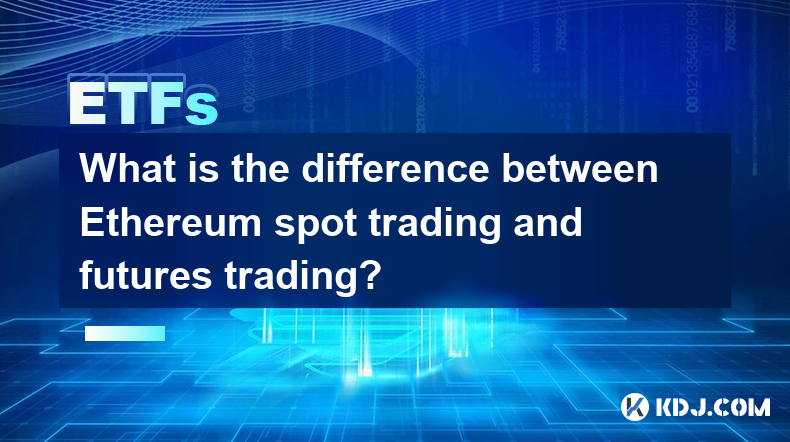
What is the difference between Ethereum spot trading and futures trading?
Key Points:
- Spot Trading: Involves the immediate exchange of Ethereum for fiat currency (like USD) or another cryptocurrency. The price is determined by the current market value at the time of the transaction. Risk is primarily associated with price volatility.
- Futures Trading: Involves an agreement to buy or sell Ethereum at a predetermined price on a future date. This allows traders to speculate on future price movements and hedge against potential losses. Risk involves price fluctuations, margin calls, and liquidation.
- Leverage: Futures trading typically utilizes leverage, magnifying both potential profits and losses. Spot trading doesn't involve leverage.
- Contract Specifications: Futures contracts have specific details like contract size, expiration date, and settlement method, impacting trading strategies. Spot trading has no such stipulations.
- Market Access: Both spot and futures markets offer access to Ethereum trading, but futures markets cater specifically to traders who want to speculate on price movements or hedge risks.
Understanding Ethereum Spot Trading
- Mechanism: In Ethereum spot trading, you buy or sell ETH at the current market price. The transaction is executed immediately. You gain direct ownership of the ETH if you buy, and you relinquish ownership if you sell. Think of it like buying a stock; you own the asset directly. The price you see on the exchange is the price you'll pay (or receive) almost instantaneously, barring any slippage due to market conditions. The trade is settled almost immediately, with the transfer of funds and cryptocurrency happening quickly. This immediacy is a core characteristic of spot trading. It is a straightforward, simple process for traders seeking direct ownership of the asset.
- Risk Management: The primary risk in Ethereum spot trading is price volatility. If the price of ETH drops after you buy, you lose money. Conversely, if the price rises after you sell, you miss out on potential gains. Risk management in spot trading often involves careful analysis of market trends, setting stop-loss orders to limit potential losses, and diversifying your portfolio. Unlike futures trading, there's no risk of margin calls or liquidation. However, the potential for loss is still significant, particularly during periods of high market volatility. Effective risk management strategies are crucial to mitigate losses and protect capital. This could involve fundamental analysis of Ethereum's underlying technology, network activity, and broader market sentiment. Technical analysis, utilizing charts and indicators, can also help in identifying potential entry and exit points.
- Trading Strategies: Spot trading strategies vary widely depending on individual trader preferences and risk tolerance. Some traders may adopt a long-term "buy-and-hold" strategy, believing in the long-term growth potential of Ethereum. Others may employ shorter-term strategies, such as day trading or swing trading, attempting to profit from short-term price fluctuations. Scalping, a high-frequency trading strategy focused on small price movements, is also possible in spot markets. Regardless of the strategy, understanding the fundamentals of Ethereum and employing disciplined risk management practices are crucial for success. Backtesting strategies using historical data can also improve the likelihood of successful outcomes.
- Fees and Regulations: Spot trading involves fees charged by the exchange for facilitating the transaction. These fees vary depending on the exchange and trading volume. Regulations surrounding spot trading also vary across jurisdictions. Traders should familiarize themselves with the specific regulations in their region to ensure compliance. Different exchanges may have different fee structures, and some may offer discounts for high-volume traders. Understanding these fee structures is essential for calculating overall profitability. Regulatory compliance is paramount; failure to comply can lead to significant penalties. Traders must therefore stay informed about relevant laws and regulations.
- Liquidity and Order Books: The liquidity of a spot market reflects how easily ETH can be bought or sold without significantly impacting its price. High liquidity is generally desirable as it ensures orders can be filled quickly at competitive prices. Order books provide transparency into the market, showing the available buy and sell orders at different price levels. This transparency allows traders to gauge market depth and assess the potential impact of their trades on the price. Analyzing order books can provide insights into market sentiment and potential price movements. Deep liquidity reduces the risk of slippage – the difference between the expected price and the actual execution price.
Understanding Ethereum Futures Trading
- Mechanism: Ethereum futures trading involves entering into a contract to buy or sell ETH at a specific price on a future date. Unlike spot trading, you don't own the ETH immediately. Instead, you're speculating on the future price of ETH. If the price moves in your favor at the contract expiration, you profit; if it moves against you, you lose. Futures contracts are standardized, with pre-defined contract sizes, expiration dates, and settlement methods. These contracts are traded on centralized exchanges, which act as intermediaries between buyers and sellers. The exchange manages the clearing and settlement of the contracts.
- Leverage and Margin: Futures trading typically involves leverage, allowing traders to control a larger position with a smaller amount of capital. This magnifies potential profits, but it also significantly increases risk. Traders must maintain a minimum margin balance in their account. If the price moves against them, and their margin balance falls below the maintenance margin level, they receive a margin call, requiring them to deposit more funds to maintain their position. Failure to meet a margin call can result in liquidation, where the exchange closes the trader's position to limit further losses. The use of leverage is a double-edged sword; it can amplify gains, but it can also lead to substantial losses.
- Risk Management in Futures Trading: Risk management in futures trading is crucial due to the amplified risk associated with leverage. Traders should employ strategies like setting stop-loss orders to limit potential losses, diversifying their positions, and carefully managing their leverage levels. Understanding the mechanics of margin calls and liquidation is essential. Proper risk assessment, including scenario planning, is vital to avoid substantial financial losses. Risk management involves a holistic approach, encompassing technical and fundamental analysis, position sizing, and stress testing.
- Trading Strategies and Contract Specifications: Futures trading offers various strategies, including hedging, speculation, and arbitrage. Hedging involves using futures contracts to protect against potential losses from price fluctuations in the spot market. Speculation involves attempting to profit from anticipated price movements. Arbitrage involves exploiting price discrepancies between different markets. Contract specifications, such as contract size, expiration date, and settlement method, significantly influence trading strategies. Understanding these specifications is crucial for effective trading. Different strategies suit different market conditions and trader risk profiles. Thorough research and understanding of the chosen strategy are vital for successful futures trading.
- Fees and Regulations in Futures Trading: Futures trading involves fees charged by the exchange, including commissions and funding rates. Funding rates are fees paid or received by traders based on the difference between the futures price and the spot price. Regulations surrounding futures trading are stringent due to the inherent risks. Traders must comply with exchange rules and applicable regulations. Exchange fees can vary significantly based on trading volume and contract specifications. Understanding these fee structures is crucial for accurate profit calculation. Regulatory compliance is essential to avoid legal repercussions and maintain the integrity of the market. Traders should always be aware of the latest regulations and updates.
Ethereum Spot vs. Futures: A Comparative Overview
The choice between spot and futures trading depends on individual trading goals, risk tolerance, and market outlook. Spot trading offers direct ownership of ETH and is simpler to understand, while futures trading provides leverage and the ability to speculate on future price movements. Both markets offer unique opportunities and challenges. A comprehensive understanding of each market is crucial for making informed trading decisions. The decision should align with individual investment goals and risk appetite. It's also crucial to recognize that neither market guarantees profit; both involve significant risk.
FAQs:
Q: What is the difference between spot and futures trading in simpler terms?
A: Spot trading is like buying ETH directly; you own it immediately. Futures trading is like betting on the future price of ETH; you don't own it until the contract expires.
Q: Which is riskier, spot or futures trading?
A: Futures trading is generally riskier due to leverage, which magnifies both profits and losses. Spot trading's risk is primarily tied to price volatility.
Q: Can I use leverage in spot trading?
A: No, leverage is not typically available in spot trading. Leverage is a key feature of futures trading.
Q: What are margin calls and liquidation in futures trading?
A: A margin call occurs when your account balance falls below the required minimum. Liquidation is the forced closure of your position by the exchange if you fail to meet a margin call.
Q: What are the benefits of using futures contracts for Ethereum?
A: Futures contracts allow for hedging against price risk, speculation on price movements, and the use of leverage to magnify potential profits (although this also increases risk).
Q: What are the benefits of spot trading Ethereum?
A: Spot trading offers direct ownership of the asset, simpler trading mechanics, and avoids the complexities of margin calls and leverage.
Q: How do I choose between spot and futures trading for Ethereum?
A: The best choice depends on your trading goals and risk tolerance. If you want direct ownership and are risk-averse, spot trading is preferable. If you want to speculate on price movements and are comfortable with higher risk, futures trading might be suitable.
Q: Are there any regulatory differences between spot and futures markets for Ethereum?
A: Yes, regulations vary by jurisdiction and differ between spot and futures markets. Futures markets are typically subject to more stringent regulations due to the higher risk associated with leverage.
Q: Where can I trade Ethereum spot and futures contracts?
A: Many cryptocurrency exchanges offer both spot and futures trading for Ethereum. It is important to research and select a reputable and regulated exchange.
Q: What are the fees involved in Ethereum spot and futures trading?
A: Fees vary across exchanges and depend on factors such as trading volume, contract specifications (in futures), and the type of order used. It's essential to review the fee schedule of your chosen exchange.
Q: What are the typical contract sizes for Ethereum futures contracts?
A: Contract sizes vary by exchange but are generally standardized to facilitate trading. It's important to check the specific contract specifications on the exchange you are using.
Q: What is the role of an exchange in Ethereum futures trading?
A: The exchange acts as a central marketplace, facilitating the trading of contracts, managing clearing and settlement, and ensuring the integrity of the market. They also enforce margin requirements and handle margin calls and liquidations.
Disclaimer:info@kdj.com
The information provided is not trading advice. kdj.com does not assume any responsibility for any investments made based on the information provided in this article. Cryptocurrencies are highly volatile and it is highly recommended that you invest with caution after thorough research!
If you believe that the content used on this website infringes your copyright, please contact us immediately (info@kdj.com) and we will delete it promptly.
- Cronos (CRO) Price Back on Track After Announcing the Withdrawal of the Investigation by the SEC
- 2025-03-29 04:40:12
- RCO Finance (RCOF) Promises 47800% Growth by Leveraging AI-Powered Trading
- 2025-03-29 04:40:12
- Aave and Chainlink Are Collaborating to Deploy a New Upgrade to the Aave Protocol
- 2025-03-29 04:35:12
- Introducing Dragoin ($DDGN): The Play-to-Earn Meme Coin Revolutionizing Crypto Gaming in 2025
- 2025-03-29 04:35:12
- From a snapshot perspective of market sentiment, cryptocurrency exchange and services provider Coinbase Global Inc COIN does not appear to be walking on auspicious grounds.
- 2025-03-29 04:30:12
- Coldware (COLD) is Rapidly Becoming the Preferred Platform for Investors and Developers Interested in Mobile-first Blockchain Applications.
- 2025-03-29 04:30:12
Related knowledge
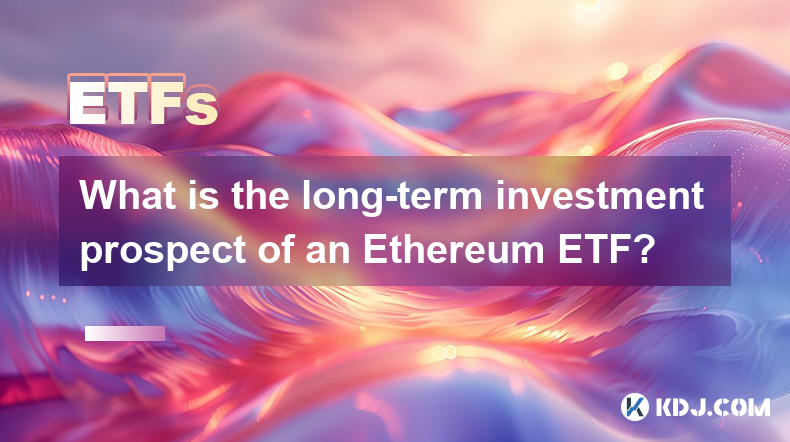
What is the long-term investment prospect of an Ethereum ETF?
Mar 18,2025 at 03:01pm
Key Points:Uncertainty surrounds the long-term prospects of an Ethereum ETF due to regulatory hurdles and market volatility.Approval hinges on regulatory clarity regarding cryptocurrencies, especially concerning investor protection and market manipulation.Successful ETF launches could boost Ethereum's price and adoption, but failure could negatively imp...
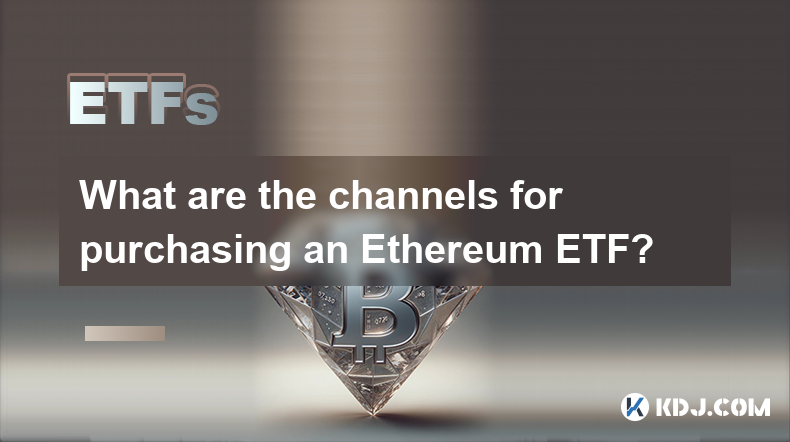
What are the channels for purchasing an Ethereum ETF?
Mar 18,2025 at 01:49am
Key Points:Currently, there are no Ethereum ETFs available for direct purchase by the general public in most major markets.Access to Ethereum exposure through ETFs is limited, mainly through futures-based ETFs.Purchasing Ethereum directly or through other investment vehicles remains a viable alternative.Regulatory hurdles and market complexities signifi...
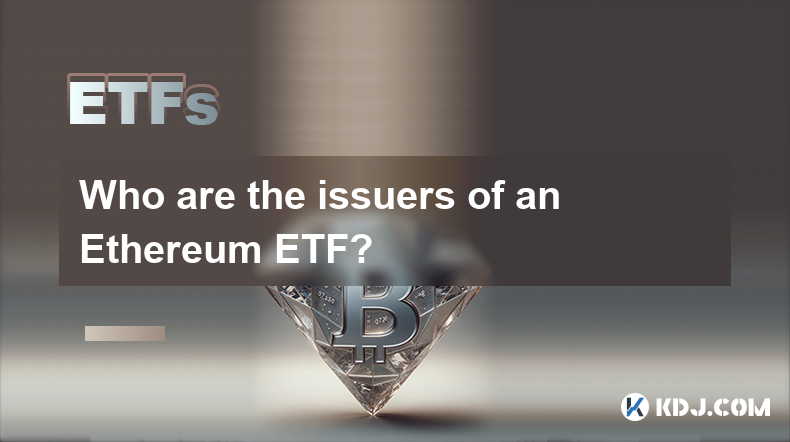
Who are the issuers of an Ethereum ETF?
Mar 19,2025 at 08:07pm
Key Points:There are no currently approved Ethereum ETFs in the US, meaning no single issuer can be definitively named. However, several firms have filed applications.The issuers of potential Ethereum ETFs will be large, established financial institutions, typically asset management companies.The specific requirements for ETF issuers are stringent and o...
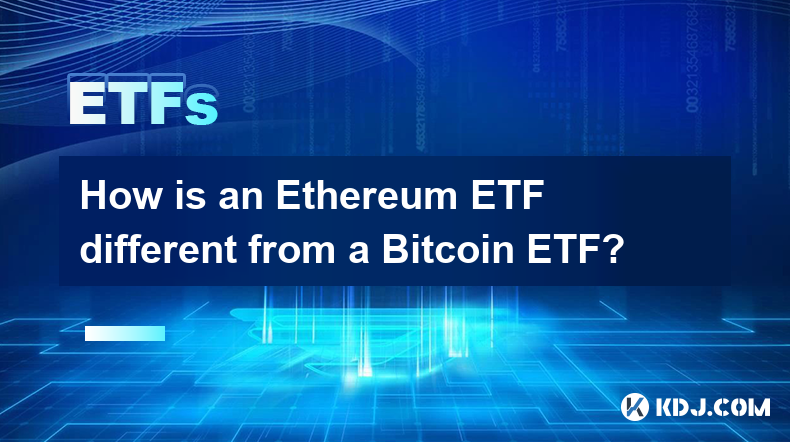
How is an Ethereum ETF different from a Bitcoin ETF?
Mar 17,2025 at 10:55am
Key Points:Underlying Asset: The core difference lies in the underlying asset: an Ethereum ETF tracks the price of Ether (ETH), while a Bitcoin ETF tracks the price of Bitcoin (BTC).Technology and Use Cases: Ethereum's blockchain supports smart contracts and decentralized applications (dApps), creating a distinct technological and investment narrative c...
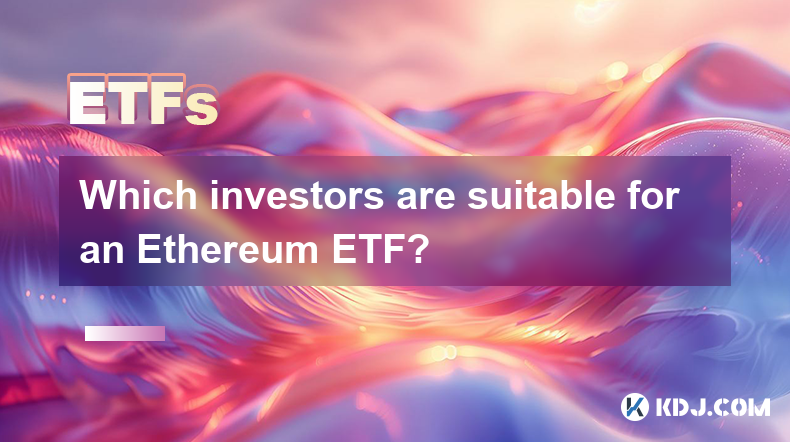
Which investors are suitable for an Ethereum ETF?
Mar 16,2025 at 05:50pm
Key Points:Risk Tolerance: Ethereum ETF investment requires a high risk tolerance due to the volatility of the cryptocurrency market.Investment Goals: Investors seeking long-term growth potential and exposure to the Ethereum ecosystem are suitable candidates.Investment Horizon: A longer-term investment horizon is crucial to weather market fluctuations.U...
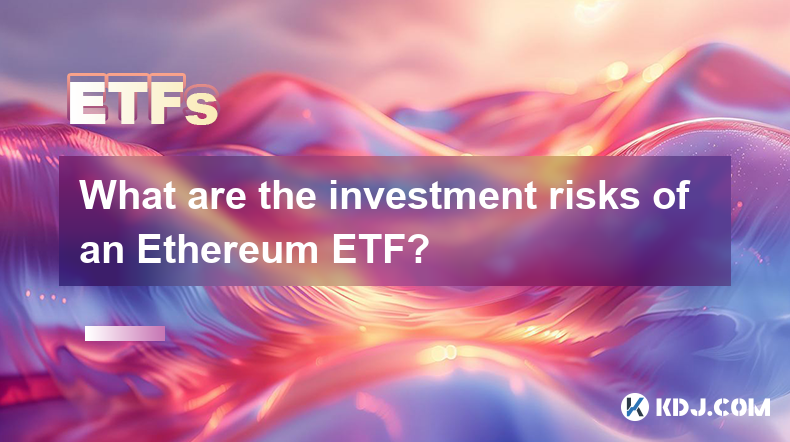
What are the investment risks of an Ethereum ETF?
Mar 18,2025 at 02:12am
Key Points:Price Volatility: Ethereum's price is highly volatile, impacting ETF share prices.Regulatory Uncertainty: Changes in regulatory landscapes can significantly affect ETF trading and performance.Market Manipulation: The potential for market manipulation, particularly in smaller ETFs, exists.Underlying Asset Risk: Risks associated with the Ethere...

What is the long-term investment prospect of an Ethereum ETF?
Mar 18,2025 at 03:01pm
Key Points:Uncertainty surrounds the long-term prospects of an Ethereum ETF due to regulatory hurdles and market volatility.Approval hinges on regulatory clarity regarding cryptocurrencies, especially concerning investor protection and market manipulation.Successful ETF launches could boost Ethereum's price and adoption, but failure could negatively imp...

What are the channels for purchasing an Ethereum ETF?
Mar 18,2025 at 01:49am
Key Points:Currently, there are no Ethereum ETFs available for direct purchase by the general public in most major markets.Access to Ethereum exposure through ETFs is limited, mainly through futures-based ETFs.Purchasing Ethereum directly or through other investment vehicles remains a viable alternative.Regulatory hurdles and market complexities signifi...

Who are the issuers of an Ethereum ETF?
Mar 19,2025 at 08:07pm
Key Points:There are no currently approved Ethereum ETFs in the US, meaning no single issuer can be definitively named. However, several firms have filed applications.The issuers of potential Ethereum ETFs will be large, established financial institutions, typically asset management companies.The specific requirements for ETF issuers are stringent and o...

How is an Ethereum ETF different from a Bitcoin ETF?
Mar 17,2025 at 10:55am
Key Points:Underlying Asset: The core difference lies in the underlying asset: an Ethereum ETF tracks the price of Ether (ETH), while a Bitcoin ETF tracks the price of Bitcoin (BTC).Technology and Use Cases: Ethereum's blockchain supports smart contracts and decentralized applications (dApps), creating a distinct technological and investment narrative c...

Which investors are suitable for an Ethereum ETF?
Mar 16,2025 at 05:50pm
Key Points:Risk Tolerance: Ethereum ETF investment requires a high risk tolerance due to the volatility of the cryptocurrency market.Investment Goals: Investors seeking long-term growth potential and exposure to the Ethereum ecosystem are suitable candidates.Investment Horizon: A longer-term investment horizon is crucial to weather market fluctuations.U...

What are the investment risks of an Ethereum ETF?
Mar 18,2025 at 02:12am
Key Points:Price Volatility: Ethereum's price is highly volatile, impacting ETF share prices.Regulatory Uncertainty: Changes in regulatory landscapes can significantly affect ETF trading and performance.Market Manipulation: The potential for market manipulation, particularly in smaller ETFs, exists.Underlying Asset Risk: Risks associated with the Ethere...
See all articles






















































































